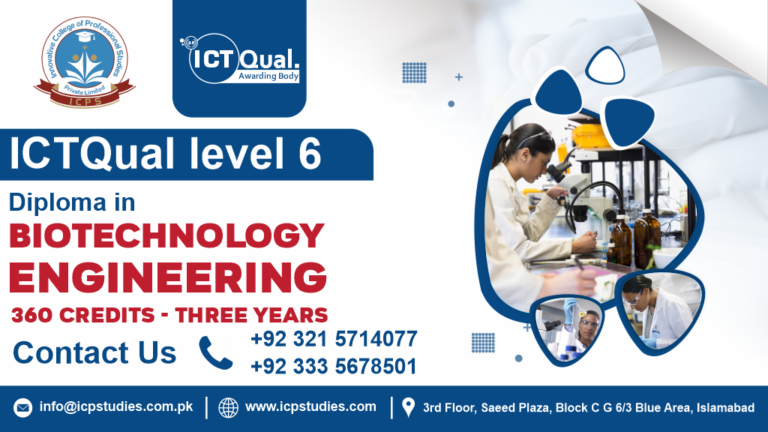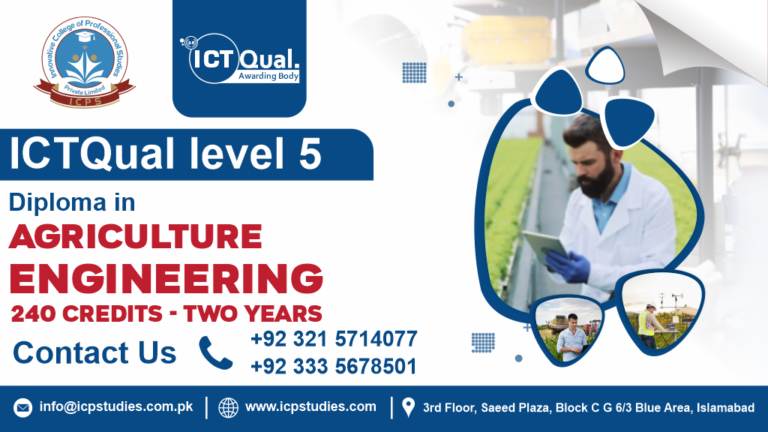The ICTQual Level 3 Diploma in Biotechnology Engineering (60 Credits) is a dynamic, six-month course designed to provide students with the advanced knowledge and hands-on skills required to thrive in the rapidly growing biotechnology field. This diploma equips learners with an in-depth understanding of biotechnology principles, engineering applications, and laboratory techniques that are essential for the development of biotechnological solutions.
This 60-credit diploma program covers a comprehensive curriculum designed to develop the practical and theoretical foundations of biotechnology engineering. It combines core scientific knowledge with technical skills to prepare students for the complexities of the biotechnology sector. The course is suitable for those looking to enter the field of biotechnology or those already working in related fields who want to formalize and expand their expertise.
The ICTQual Level 3 Diploma in Biotechnology Engineering (60 Credits) is an essential qualification for anyone looking to break into or advance in the rapidly growing biotechnology industry. With its hands-on learning approach, comprehensive curriculum, and strong industry relevance, this course will prepare you for an exciting and impactful career in biotechnology. Whether you’re just starting out or seeking to build on existing knowledge, this diploma opens the door to a wide range of career opportunities across various sectors.
All About ICTQual Level 3 Diploma in Biotechnology Engineering 60 Credits – Six Months
Course Overview
Welcome to the ICTQual Level 3 Diploma in Biotechnology Engineering, an intensive six-month course designed to provide you with the essential knowledge and practical skills required to excel in the rapidly evolving field of biotechnology engineering. This qualification is worth 60 credits and is structured to ensure you gain a comprehensive understanding of key biotechnology concepts, principles, and engineering practices.
Throughout this course, you will explore the intersection of biology, chemistry, and engineering technologies, learning how they can be applied to develop innovative solutions in healthcare, agriculture, environmental protection, and industrial biotechnology. You will study a broad range of topics, including molecular biology, genetic engineering, bioprocessing techniques, bioinformatics, and biotechnology safety standards.
This program is ideal for individuals seeking to advance their career in biotechnology, whether you are starting in the field or looking to build on existing technical expertise. The curriculum has been designed to blend theoretical knowledge with practical skills, preparing you for roles in research, development, production, and quality control within biotechnology and related industries.
By the end of the course, you will have developed the expertise to manage and contribute to biotechnology projects, apply engineering solutions to biological processes, and understand the regulatory and ethical considerations involved in biotechnology work.
This course offers a solid foundation for a successful career in biotechnology engineering, helping you acquire the skills necessary to work in dynamic environments and make impactful contributions to the biotechnology industry.
Start your journey today, and be part of the future of biotechnology innovation!
Study Units
- Introduction to Biotechnology and Engineering Principles
- Cell Biology and Molecular Genetics
- Bioprocessing and Bio-manufacturing Techniques
- Biotechnology Laboratory Techniques and Safety Protocols
- Genetic Engineering and Biotechnology Applications
- Biotechnology Project Management and Professionals
To ensure that you are well-prepared for the ICTQual Level 3 Diploma in Biotechnology Engineering, applicants must meet the following entry requirements:
- Academic Qualifications:
- Minimum of 5 GCSEs at grade C/4 or above, including Mathematics, English, and a Science subject (Biology, Chemistry, or Physics).
- Alternatively, Level 2 qualifications in a relevant field (e.g., BTEC Level 2 in Science or Engineering) may be considered.
- Age Requirement:
- Applicants must be at least 16 years old at the time of enrollment.
- Prior Knowledge and Skills:
- A basic understanding of mathematics and scientific principles is essential, as the course will involve both theoretical and practical aspects of biotechnology engineering.
- Practical skills in laboratory environments, although not required, would be advantageous.
- English Language Proficiency:
- Non-native English speakers must have a minimum IELTS score of 5.5 or equivalent in another recognized language proficiency test.
- Alternatively, if you have studied in English at secondary or post-secondary level, this requirement may be waived.
- Personal Motivation and Interest:
- A strong interest in biotechnology, engineering, and scientific research is recommended, as this will support your success and engagement in the course.
- An enthusiasm for problem-solving and a curiosity for new technologies will also be valuable throughout your learning.
- Additional Requirements (Optional):
- If you have work experience or qualifications in a related field (e.g., biotechnology, engineering, or laboratory work), it may strengthen your application but is not mandatory.
If you do not meet the above criteria but have relevant work experience or other qualifications, we encourage you to contact the course team to discuss potential alternative pathways for admission.
Note: Entry requirements may vary depending on specific circumstances or pathways. Please reach out to the course provider for any clarifications or exceptions.
The ICTQual Level 3 Diploma in Biotechnology Engineering is designed for individuals who are passionate about pursuing a career in the dynamic and rapidly growing biotechnology industry. This course is suitable for:
- School Leavers:
- If you have recently completed your GCSEs or equivalent and are looking to pursue a career in biotechnology or engineering, this course provides a strong foundation for further education or employment in the field.
- Individuals Looking to Change Careers:
- If you are considering a career change and have an interest in biotechnology, life sciences, or engineering, this course is ideal for those with transferable skills from other industries. It provides the technical and theoretical knowledge needed to transition into this exciting field.
- Technicians and Operators:
- This course is also suitable for those already working in the biotechnology, pharmaceutical, or laboratory sectors who wish to upskill or advance their career. It will equip you with a deeper understanding of biotechnology engineering principles, enhancing your expertise in your current role.
- Aspiring Biotechnology Engineers:
- If you aim to work as a biotechnology engineer, lab technician, bioprocess engineer, or in any other related role, this course will provide the core skills and qualifications required to succeed in the industry.
- Individuals Interested in Research and Development:
- If you are interested in scientific research and the development of new biotechnology applications, this course provides the knowledge and skills necessary for roles in R&D, including bioprocessing, genetic engineering, and laboratory work.
- Graduates Looking to Specialize:
- If you already have a background in science, engineering, or a related field and want to specialize in biotechnology engineering, this diploma will enhance your qualifications and open up advanced career opportunities.
- Entrepreneurs in Biotechnology:
- Those looking to launch their own business or startup in the biotechnology field will benefit from a strong understanding of both the engineering and biological aspects of the industry, which this course provides.
Overall, this course is ideal for anyone eager to work in biotechnology, whether you are starting your career, seeking to advance your knowledge, or looking to specialize in biotechnology engineering.
Learning Outcomes
Introduction to Biotechnology and Engineering Principles
By the end of this unit, learners will be able to:
- Comprehend the core concepts and history of biotechnology.
- Explain the role of engineering in biotechnology and its diverse applications across industries.
- Identify key biotechnological processes utilized in healthcare, agriculture, and environmental science.
- Evaluate the ethical considerations and their influence on biotechnology practices.
2. Cell Biology and Molecular Genetics
By the end of this unit, learners will be able to:
- Demonstrate a clear understanding of cell structure and function.
- Explain the processes of DNA replication, transcription, and translation in cellular biology.
- Analyze genetic inheritance patterns and the mechanisms of genetic mutations.
- Apply molecular genetics techniques such as PCR and gene editing in practical settings.
3. Bioprocessing and Bio-manufacturing Techniques
By the end of this unit, learners will be able to:
- Grasp the principles of bioprocessing and bio-manufacturing within the biotechnology industry.
- Describe the operation and function of bioreactors and fermentation processes.
- Assess downstream processing methods and recognize the importance of purification in biotechnology.
- Implement quality control measures and adhere to assurance standards in bio-manufacturing operations.
4. Biotechnology Laboratory Techniques and Safety Protocols
By the end of this unit, learners will be able to:
- Operate laboratory equipment and tools commonly used in biotechnology.
- Apply safety protocols and risk management strategies within laboratory settings.
- Perform laboratory tasks such as aseptic cultures, media preparation, and sterilization with precision and safety.
- Design experiments, document data, and analyze results to draw accurate conclusions in biotechnology contexts.
5. Genetic Engineering and Biotechnology Applications
By the end of this unit, learners will be able to:
- Describe the fundamental principles and techniques of genetic engineering, including gene-editing technologies like CRISPR.
- Implement genetic engineering methods to modify microorganisms, plants, and animals.
- Evaluate the applications of genetic engineering in fields such as medicine, agriculture, and environmental conservation.
- Discuss the ethical, legal, and regulatory issues surrounding genetic engineering practices.
6. Biotechnology Project Management and Professional Practice
By the end of this unit, learners will be able to:
- Understand the principles and tools of project management, including effective time management and resource allocation.
- Plan and manage biotechnology projects from initiation through to completion, ensuring timelines and budgets are adhered to.
- Communicate effectively within biotechnology teams, promoting collaboration and professionalism.
- Demonstrate ethical conduct and uphold professional standards in biotechnology engineering practice.
FAQs about ICTQual Level 3 Diploma in Biotechnology Engineering 60 Credits – Six Months







